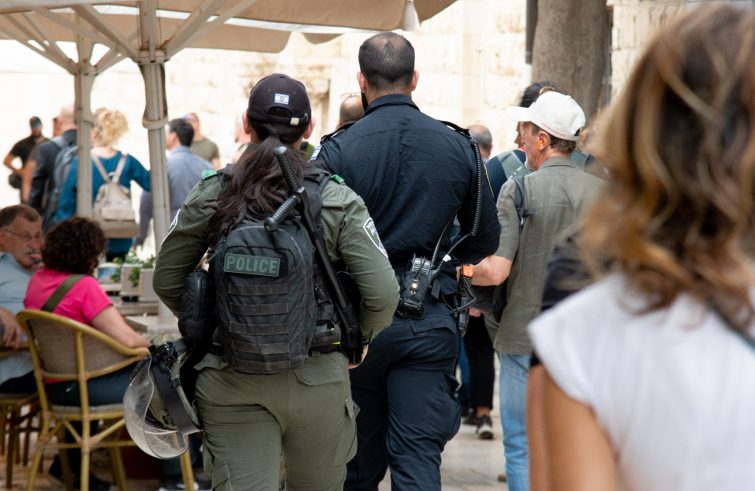
(Ain Arik) Ain Arik is a Palestinian village of about 2000 inhabitants located a few kilometres north of Ramallah. In order to get there, you have to cross the Israeli separation barrier. On arrival, the first thing that catches the eye is the presence of the bell towers of the two local churches, the Latin and the Orthodox, next to the minaret of the nearby mosque. This physical proximity is evidence of a long history of interfaith coexistence. Today, the mayor is a Christian, although two-thirds of the villagers are Muslim, including refugee families who moved here from Haifa after the founding of the Israeli state in 1948. A total of 250 pupils, the vast majority of whom are Muslim, study at the Latin Patriarchal School under the guidance of Father Firas Abedrabbo. A small group of monks and nuns belonging to the Little Family of the Annunciation (Italy), a community founded by Giuseppe Dossetti in the early 1950s, settled in the village in the mid-1980s. The local population also shares the suffering caused by the Israeli occupation, which was aggravated by the Hamas terrorist attack of 7 October, as some Christian villagers reported during a meeting with Cardinal Matteo Zuppi, Archbishop of Bologna, held a few days ago in the small church of the Latin parish. The President of the Italian Episcopal Conference was accompanied by a group of Christians who travelled to the Holy Land on a peace and solidarity pilgrimage promoted by Bologna’s Archdiocese.
- (Foto Sir)
- (Foto Sir)
Living under occupation. “We are going through a very difficult time. We pray to the Lord to bring justice,” said Khalil, a veteran of the two intifadas and a long-time politician in the local council, of which he served as president. “The ongoing war in Gaza has had an impact here in the West Bank,” he emphasised. “We are witnessing a veritable massacre of Palestinians. A few days ago, four young men were killed by the Israeli army in the nearby village of Kafar Naeme. Since 7 October, the blockades and military raids have intensified. Israel has revoked work permits, leaving many families without a source of income. Permits to pray in Jerusalem have also been suspended. Only 50% of the water under Israeli control is being delivered. The army’s raids have damaged schools, roads and pharmacies. We are desperate”. The solution is ‘two peoples, two states’, but Israel’s only thought is colonisation.” The international community should stand by the Palestinian people and support their dream of peace.
 The voice of young people. The Muslims are suffering, as are the Christians, who constitute a minority. Jacqueline, a young newlywed with a young daughter, said: “Many of us are planning to emigrate, it is a constant thought.”
The voice of young people. The Muslims are suffering, as are the Christians, who constitute a minority. Jacqueline, a young newlywed with a young daughter, said: “Many of us are planning to emigrate, it is a constant thought.”
“Staying in our homeland, the place where we were born and raised, and living with dignity and under the rule of law, is the biggest challenge for us Christians. The decades of conflict have become part of our DNA, part of our daily life, along with the fear of being arrested.”
Jacqueline shares her own story: “My husband, my father and my brother were arrested by Israeli soldiers during a night raid on our house. Our crime was to have an iron workshop. That was enough for Israel to consider us potential weapons manufacturers. They destroyed our entire workshop. But when we hear the news coming out of Gaza, we feel that we should be grateful to God that we are not in their position.” Jeries is 18 years-old. He has a future ahead of him and higher education to complete. Unfortunately, in his experience, “even finishing school is a challenge. After many years of studying, we often end up doing jobs for which we neither studied nor have the skills. Living under the occupation also means that you are not allowed to go to Ramallah to visit your friends. You never know what might happen to you, you risk being stopped and arrested by the Israeli soldiers.”
 Marianne studies computer engineering at Birzeit University, known as the ‘University of the Martyrs’ because many of its students have given their lives to demand freedom and justice for Palestine. Whenever we see their pictures on the campus, we wonder if we will be the next to die.
Marianne studies computer engineering at Birzeit University, known as the ‘University of the Martyrs’ because many of its students have given their lives to demand freedom and justice for Palestine. Whenever we see their pictures on the campus, we wonder if we will be the next to die.
The Israeli occupation makes no distinction between Christians and Muslims, we are all Palestinians.
Our people are known to be among the most learned in the Arab world, and a learned people are more frightening than an ignorant one, so Israel does everything it can to hinder our education. The military often enters our university and arrests students for no reason at all.” Living under military occupation does not stop the Christians of Ain Arik from “praying for peace and trying as much as possible to forget that we are at war and under occupation We are young Palestinians who, like all our peers in the world, have our dreams to fulfil, our whole lives to build, but it’s harder in these circumstances. The Church and the parish have always been a place of refuge and a source of spiritual and material support for all of us. This presence gives us hope.”














